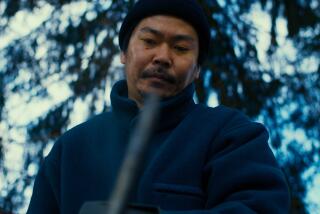Television Review : ‘Madadayo’ Opens Salute to Kurosawa
Although Akira Kurosawa did not intend “Madadayo” to be his final film, he could not have made a more fitting finale to one of the greatest careers in the history of the cinema. A gentle, humorous contemplation of the inevitability of old age and mortality, “Madadayo” celebrates the enduring joys of camaraderie and the rewards of kindness and opens a monthlong Turner Classic Movies retrospective on the director, which begins at 5 p.m today.
For his 30th film in a half-century of directing, Kurosawa returns to the concerns of one of his classics, the 1952 “Ikiru” (To Live). Actually, the hero of the earlier film, a government office worker who does not learn how to live until he learns that he is terminally ill, becomes the man that “Madadayo’s” hero already is. The year is 1943, and Hyakken Uchida (Tatsuo Matsumura, in a masterful portrayal), a revered professor of German, announces to his all-male class that at age 60 he is retiring because he has reached the stage where he can support himself on his scholarly books. A humorist and philosopher, Uchida has won his students’ hearts as their frequent drinking companion. He has given them his time and concern, and they in turn feel that they have learned from him “much more than German.”
His students help him and his wife (Kyoko Kagawa) move in to a fine old, traditional-style home in a beautiful, woodsy Tokyo neighborhood that no scholar could hope to afford today. In short order, the house is bombed, and the Uchidas uncomplainingly move to a gardeners’ shack on the estate of a nobleman whose mansion has also been destroyed by bombs. Never fear, a group of Uchida students are swiftly on the spot to provide their professor with whatever he needs--and they clearly will remain vigilant to the end of his life. No movie star or monarch could inspire more steadfast devotion. Kurosawa finds some humor in their fervor, yet Uchida radiates such warmth and wisdom, expressed with a jaunty light touch, that you can understand how he could be accorded such fidelity.
With each passing year, the professor, who has his own alumni association, is honored with a birthday banquet at which he invariably exclaims “Madadayo!,” which translates as “not yet,” meaning he’s not ready to pass from this life. Uchida continues to lecture from time to time, and his life settles down into a pleasant routine. He’s thrown into a crisis when a stray cat he’s taken in disappears; it takes time and effort for him to come to terms with the feelings of mortality the loss of the pet unexpectedly signifies, but in working through his over-reaction he emerges tranquil and accepting of whatever the future holds for him.
“Madadayo” flows like a forest stream, and it risks seeming slow and sentimental on the surface when it is in fact leisurely in the most positive sense. So effortlessly does it unfold that you scarcely notice how evocative, even profound, is its impact by the time it is over.
Completed in 1993, “Madadayo” has yet to play Los Angeles, but then we’re still waiting for Fellini’s delightful and contemplative final film, “Voices of the Moon” (1989), in which no less than Roberto Benigni stars as a wistful wayfarer who hears voices.
* “Madadayo” airs today at 5 p.m. on TCM, followed by four other Kurosawa films: “Sanshiro Sugata” at 7:30 p.m.; “Drunken Angel” at 9 p.m; “The Hidden Fortress” at 11 p.m.; and “The Men Who Tread on the Tiger’s Tail” at 1:30 a.m. The retrospective continues each Friday through September.
More to Read
Only good movies
Get the Indie Focus newsletter, Mark Olsen's weekly guide to the world of cinema.
You may occasionally receive promotional content from the Los Angeles Times.










